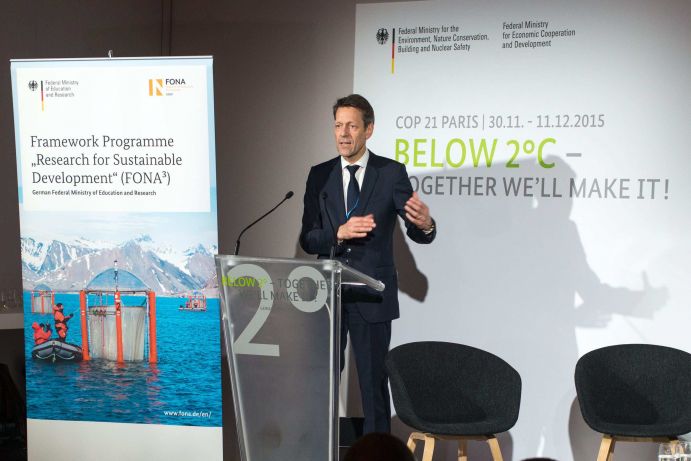Side-Events of BMBF-funded Climate Research Projects at the 21st Climate Summit (COP 21) in Paris
From November 30th until December 11th 2015, the 21st Climate Summit (COP 21) in Paris will negotiate a modern and contemporary agreement designed to engage all countries to take climate mitigation measures. The main findings of the Intergovernmental Panel on Climate Change (IPCC) show that global warming is accelerating, and its main driving force is humankind.

During the COP 21 in Paris, the German Federal Research Ministry is holding three side-events that will present various climate research projects. Interested participants are welcome to take part in the following side-events:
BMBF Side Event „Science‐based Climate Policy: From Research to Decision Making”
Date: 3 December 2015, 4‐6 p.m.
Venue: German Pavilion (Hall 2b), Le Bourget, Conference Centre
Research enables the assessment of risks for economy and society, supporting decision making at all levels. The Side Event illustrates important links in this chain ranging from uncertainties regarding the physical science basis and the risks of future climate change, to the challenges of science communication, to the co‐production of knowledge for decision making. The event provides an opportunity to present highlights of German climate research activities.
Speakers:
- Dr. Karl Eugen Huthmacher, German Federal Ministry of Education and Research (BMBF)
- Prof. Hans‐Otto Pörtner, Alfred Wegener Institute (AWI), IPCC AR 6 Co‐Chair WG II
- Dr. Grit Martinez, Ecologic Institute
- Christoph Bals, Germanwatch
- Prof. Ottmar Edenhofer, Potsdam Institute for Climate Impact Research (PIK), Mercator Research Institute on Global Commons and Climate Change (MCC)
BMBF-Side Event „ Strengthening Africa’s Competence in Combating Climate Change – African‐German Cooperations in Education and Research”
Date: 8 December 2015, 6‐8 p.m.
Venue: German Pavilion (Hall 2b), Le Bourget, Conference Centre
SASSCAL and WASCAL, the Regional Science Service Centres on Climate Change and Adapted Land Use in West and Southern Africa, are cooperative initiatives of fifteen countries in Western and Southern Africa. Together with Germany they build up strong partnerships for joint research and capacity building as well as climate services and infrastructure development. German and African high level representatives share their experiences and showcase innovative models for long‐term regional collaboration to combat climate change and adapt land management.
Speakers:
- Dr. Georg Schütte, State Secretary, German Federal Ministry of Education and Research (BMBF)
- Prof. Francois Adébayo Abiola, Vice‐Prime Minister, Minister of Higher Education & Scientific Research (Benin), Chair of the WASCAL Council of Ministers
- Dr. Henry Mwima, Executive Director, SASSCAL (Namibia)
- Prof. Norbert Jürgens, Scientific Advisor and Head of Coordination Team at University of Hamburg (Germany)
- Dr. Laurent Sedogo, Executive Director, WASCAL (Ghana)
- Prof. Janet Adelegan, Director of the Capacity Building Programme, WASCAL (Burkina Faso)
ZEW Side-Event within the BMBF funding priority “Economics of Climate Change”, „The Economics of Climate Change: The Effect of Climate Policy on Innovation, Competitiveness and Employment”
Date: 9 December 2015, 10:30 a.m. – 12:00 p.m.
Venue: EU Pavilion, Room Luxembourg (Hall 2b), Le Bourget, Conference Centre
Futher Information: www.zew.de/en/veranstaltungen/2228
BMBF and ZEW organise a side event at COP21 in Paris. Climate policies have significant repercussions for the economy with notable implications for the optimal design of policies. While climate policies may negatively impact economic competitiveness and employment, they can also inspire environmental innovations and thus have a positive effect on the economy. This session will consider the link between environmental policy measures, competitiveness and employment in Germany – a global forerunner in clean technologies and climate policies.
Speakers:
- René Haak, German Federal Ministry of Education and Research (BMBF)
- Katrin Sommerfeld, Centre for European Economic Research (ZEW)
- Florens Flues, Organisation for Economic Co‐operation and Development (OECD)
- Ingmar Jürgens, European Commission, Representation in Germany
- Oliver Schenker, Centre for European Economic Research (ZEW)
- Joachim Schleich, Fraunhofer Institute for Systems and Innovation Research (ISI)



